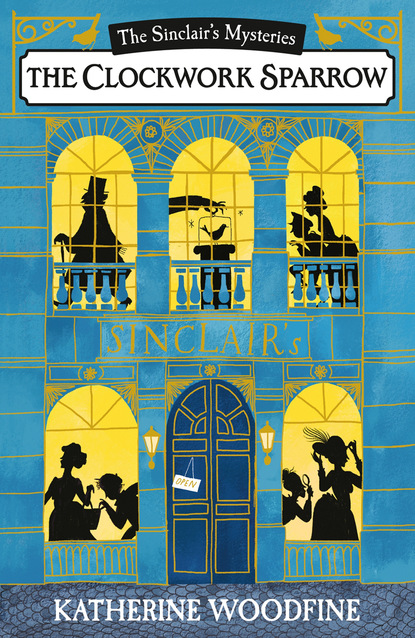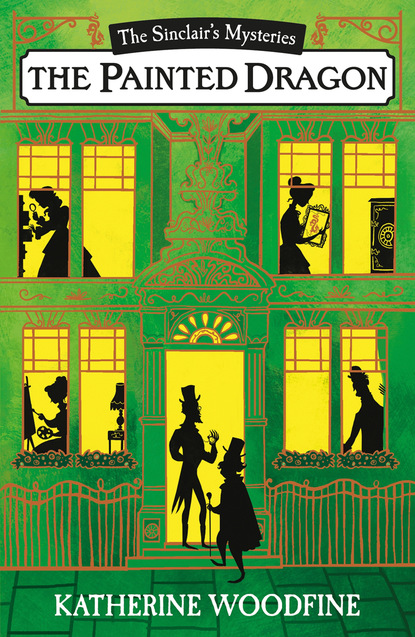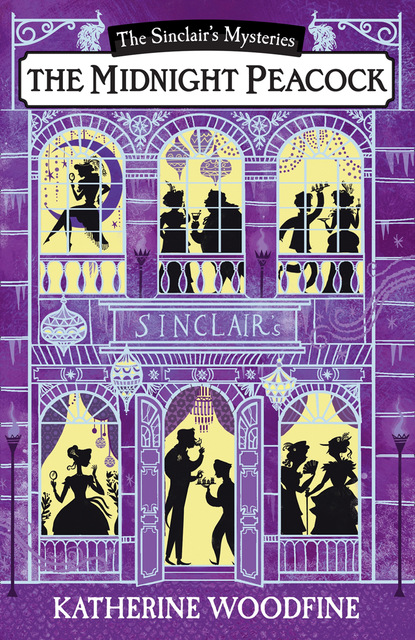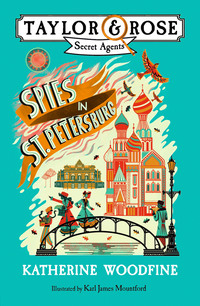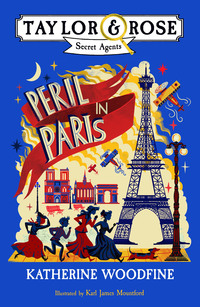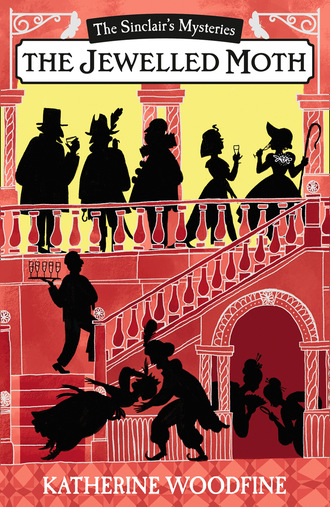
Полная версия
The Jewelled Moth

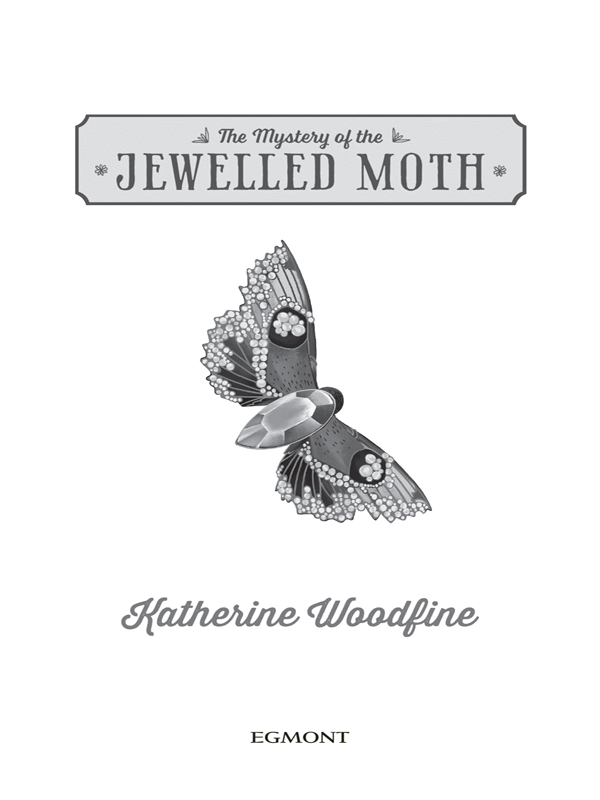

First published in Great Britain 2016
by Egmont UK Limited
The Yellow Building, 1 Nicholas Road, London W11 4AN
Text copyright © 2016 Katherine Woodfine
Illustrations copyright © 2016 Júlia Sardà
The moral rights of the author and illustrator have been asserted
First e-book edition 2016
ISBN 978 1 4052 7618 4
Ebook ISBN 978 1 7803 1684 0
www.egmont.co.uk
A CIP catalogue record for this title is available from the British Library
All rights reserved. No part of this publication may be reproduced, distributed, or transmitted in any form or by any means, or stored in a database or retrieval system, without the prior written permission of the publisher.
Stay safe online. Any website addresses listed in this book are correct at the time of going to print. However, Egmont is not responsible for content hosted by third parties. Please be aware that online content can be subject to change and websites can contain content that is unsuitable for children. We advise that all children are supervised when using the internet.

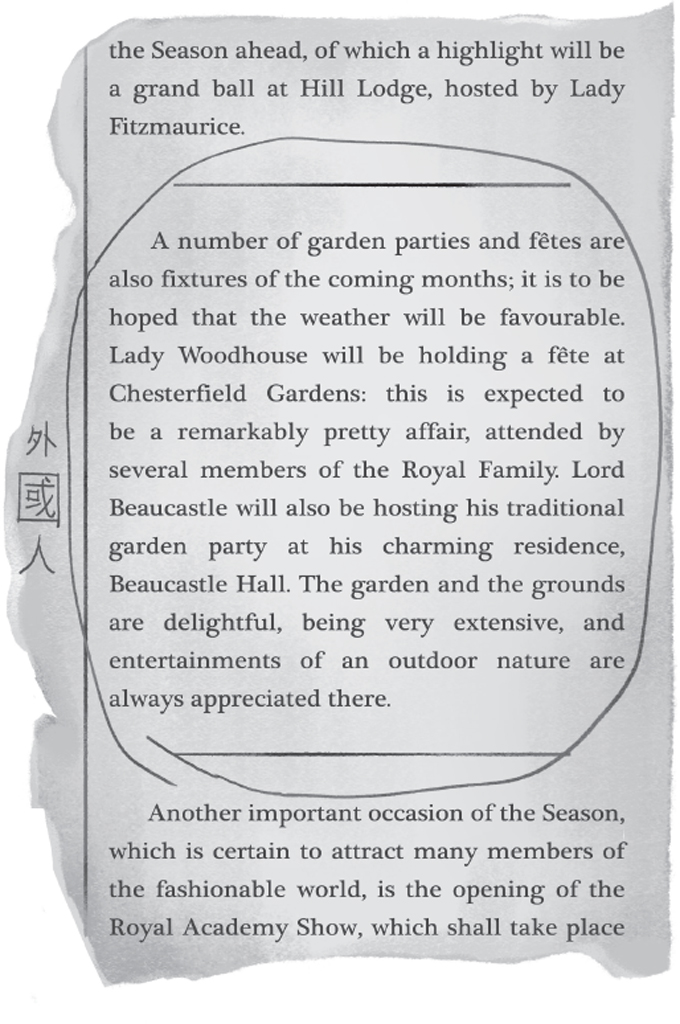
CONTENTS
Cover
Title Page
Copyright
Dedication
Front series promotional page
PART I The London Season
CHAPTER ONE
CHAPTER TWO
CHAPTER THREE
CHAPTER FOUR
CHAPTER FIVE
PART II Excursions and Amusements
CHAPTER SIX
CHAPTER SEVEN
CHAPTER EIGHT
CHAPTER NINE
CHAPTER TEN
CHAPTER ELEVEN
PART III The Proper Paying of Calls
CHAPTER TWELVE
CHAPTER THIRTEEN
CHAPTER FOURTEEN
CHAPTER FIFTEEN
CHAPTER SIXTEEN
CHAPTER SEVENTEEN
CHAPTER EIGHTEEN
CHAPTER NINETEEN
CHAPTER TWENTY
PART IV The Debutante Ball
CHAPTER TWENTY-ONE
CHAPTER TWENTY-TWO
CHAPTER TWENTY-THREE
CHAPTER TWENTY-FOUR
CHAPTER TWENTY-FIVE
CHAPTER TWENTY-SIX
PART V The Supper Party
CHAPTER TWENTY-SEVEN
AUTHOR’S NOTE
ACKNOWLEDGEMENTS
Back series promotional page
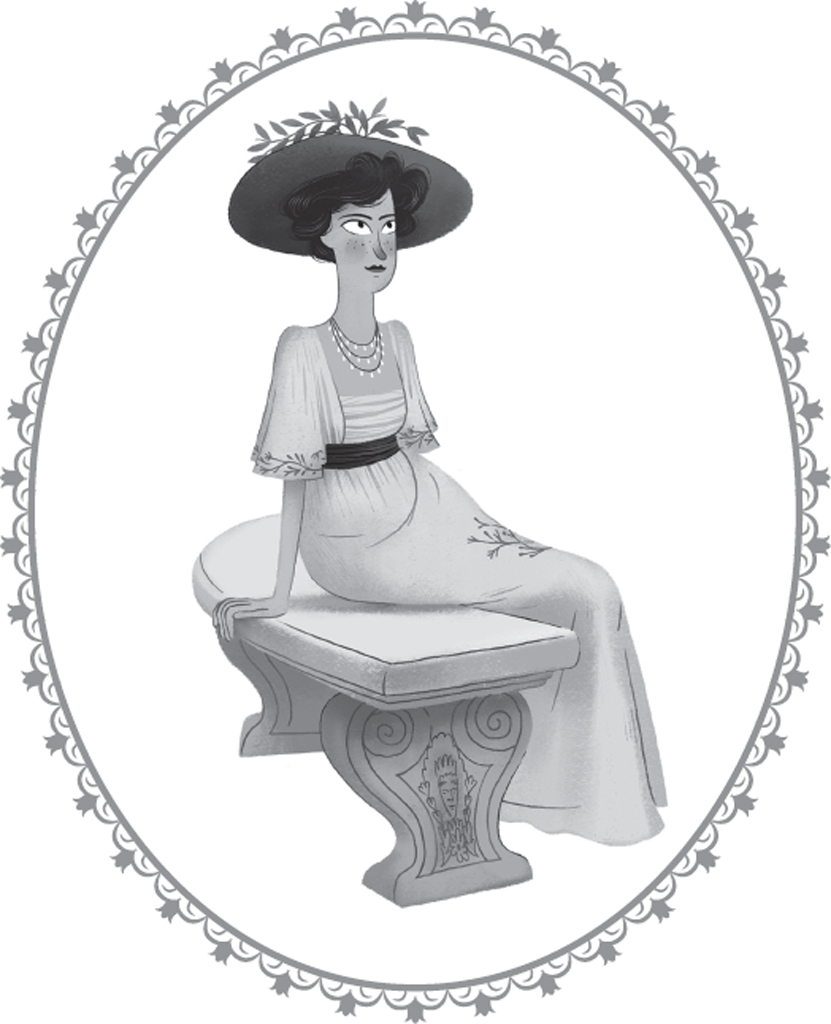
PART I
The London Season
From the opening of Covent Garden to the Royal Academy show, from Ascot to the Royal Drawing Rooms, the London Season is rightly considered the finest and most elegant of any European capital. Young ladies preparing to make their debut in London society will feel themselves to be especially fortunate. However, they will enjoy the delights and entertainments of their first Season all the more by ensuring they are equipped with a correct understanding of etiquette: the rules that govern the proper behaviour of a young lady in society.
From Lady Diana DeVere’s Etiquette for Debutantes: a Guide to the Manners, Mores and Morals of Good Society, Chapter 1: The London Season – Court Presentation – St James’s and Buckingham Palaces – Who may be Presented – Court Dress – Rules and Regulations – The Drawing Room – The Levee
CHAPTER ONE
The green parrot was squawking downstairs. Mei rolled over and closed her eyes again, longing to slide back into sleep. She could hear voices in the street; the singing of the kettle; horns hooting on the river; and horses’ hooves clattering over the cobbles outside: all the familiar sounds that spoke to her of morning . For a moment or two, she just lay there, letting them wash over her, but at last she forced her eyes to open once more. She could already feel the warmth of the sun streaming through the chinks in the curtains, falling in long stripes over the bedclothes. She had overslept again, and Mum might be in a scolding mood.
Hurriedly, she sat up in bed, and pushed aside the curtain that separated her corner of the room from the larger portion where her three brothers slept. Their beds were already empty: her eldest brother, Song, must have left for his job in the kitchen at Ah Wei’s Eating House, and the twins, Shen and Jian, would be on their way to school.
At once, she hopped out of bed. It really must be late: why hadn’t Mum called her? Only a minute or two later she was hastening down the stairs, still doing up the buttons on her striped frock as she went.
The stairs were steep and narrow and creaked as she went down them. The Lim family house was an odd little place, squashed right up against its neighbours in a cramped street in Limehouse, East London. It was all crooked angles and dark corners and patches of damp, but every square inch of it was friendly to Mei. She had been born here in the bedroom above the shop; she and her brothers had grown up here; she couldn’t imagine what it would be like to live anywhere else.
As she always did, she jumped down the last few steps into the stone-flagged hallway. To one side was the door into the shop, which stood ajar, letting all the familiar scents of tea and spices and tobacco flood in. To the other was the back room, where the range was, and where the family spent most of their time. But before she pushed the door open and went in, she came to a sudden halt outside.
She could hear Mum and Dad talking in the back room. There was nothing unusual in that, but what was strange was the way they were talking. Their voices sounded hushed, even anxious.
For a moment, she hesitated outside the door. Dad was saying in an urgent tone: ‘We’ve got no other option, Lou. You must see that.’
‘But if we give them what they want, we’ll hardly be scraping by! And what if next month, they ask for more? I’ll not be intimidated like this,’ said Mum indignantly.
Dad’s voice was tight. ‘Do you want to lose this house, the shop, everything that we’ve worked for?’ His voice dropped lower. ‘Remember what happened to the Goldsteins. Is that how you want us to end up?’
The Goldsteins . Mei felt a little shiver run along her spine. Mr Goldstein had been a pawnbroker: his little shop was just a few streets away. He and his wife had been a quiet old couple, though Mrs Goldstein had always said good morning when Mei and her brothers went past on their way to school. But just a couple of months ago there had been a terrible fire: the whole building, including the pawnbroker’s shop, had been burned to the ground, and both Mr and Mrs Goldstein had died. It had been a dreadful accident, Mei had thought, but now it seemed suddenly far more sinister and terrible. Is that how you want us to end up? What could Dad possibly mean by that?
‘Of course not! But –’ Mum began.
It came to Mei suddenly that she was eavesdropping; something that she had always been taught was a low-down thing to do. She pushed the door open and went through into the back room. Immediately, both her parents stopped talking.
‘Well, here she is at last, the Sleeping Princess herself,’ said Mum in her ordinary voice, just as if nothing out of the usual way had been happening. She was rolling out some pastry, stopping occasionally to stir or season a pan of broth that was steaming at her elbow. Whatever she was doing, Mum always seemed to be doing something else at the same time. More often than not, she was undertaking half a dozen things at once.
‘Hope those boys have left you some breakfast,’ said Dad, tweaking the end of Mei’s long plait, as she slipped into a seat beside him at the well-scrubbed wooden table.
‘You’d sleep the whole day through if we let you,’ Mum said, shaking her head at Mei, but her eyes were twinkling. ‘You must get those lazy bones from your Dad’s side of the family.’
Dad made a shocked face, as if he was mortally offended, then jabbed playfully at Mum with his newspaper. She pretended she was going to retaliate with the rolling pin, then shrieked and dived behind Mei’s chair, laughing, as Dad got to his feet to give chase.
Mei couldn’t help laughing too, and in the corner, the green parrot squawked happily as though he were joining in. It was quite as if the tense conversation she had heard through the door had never happened, and she almost began to wonder if she had imagined those serious, fearful voices. They hadn’t sounded like Mum and Dad at all.
Mei knew that her parents weren’t quite like everyone else’s. They were always laughing and joking, and doing what Mr Walker, the schoolmaster, would call ‘playing the fool ’ in his most disapproving voice. Mei had once been invited to tea with Jessie Bates, and her family had been so different: Jessie’s father was so grim and strict that everyone sat around in silence, not daring to say anything more than ‘pass the salt’. Mei had scarcely been able to believe it. Imagine being frightened of your own father! Mei’s Dad was one of the kindest and gentlest people she knew. And to think that Jessie and some of the others had actually turned up their noses at her family, just because her mother was English and her father Chinese!
Happily, she did not have to worry about that kind of thing much any more. Now that she’d turned fourteen and left school, she rarely needed to step outside the little network of Limehouse streets that people called ‘China Town’. Here, there were just as many Chinese faces as there were English ones – most of them merchant sailors – firemen, seamen, stewards, cooks and carpenters, who served on board the steamers plying between China and the Port of London, and would pass a few weeks at one of the lodging houses before working their passage back home on another steamship. But there was also a sprinkling of families like Mei’s own. She’d heard people say that China Town was dangerous and sinister – a dark place of opium dens and gaming houses, but that wasn’t the Limehouse that Mei knew. The streets might be dirty; the people might be poor; but here, she felt at ease. Here, no one turned up their noses. On the contrary: Lim’s shop was at the very heart of China Town, just down the street from Ah Wei’s Eating House; across from the laundry and the Seven Stars Inn; and around the corner from Madame Wu’s Magnificent Magic Lantern Show. Everyone came to Lim’s shop, and everyone knew Mei and her family.
‘You’ll run some errands for me this morning,’ Mum was saying now, bouncing Mei suddenly back out of her thoughts. She realised that the clock on the mantelpiece was striking the hour and that Dad was going through to the shop. ‘I need you to go to the baker, and the fish shop, and the cobbler. And for mercy’s sake, don’t come back without the fish like last time!’
Since Mei had left school, it was her job to help around the house and in the shop. Her older brother Song went out to work, of course, but as the only girl of the family, it was up to her to help Mum and Dad. She knew she was lucky to be able to do so. Most Limehouse families didn’t have the luxury of keeping their daughters at home, and half the girls in her old class at school were now working in the white-lead factory, or at the box-maker’s.
‘But take this upstairs before you go,’ Mum went on, handing her some folded linen, smelling soapy-clean from Monday’s wash. ‘I’ve got people coming to see about the room later.’
Mei took the stack of linens carefully up the steep stairs to the attics. Up here, little windows in the roof let in tiny glimpses of sky and patches of sunshine, and she almost tripped over their white cat, Tibby, who was sitting on the attic landing outside Uncle Huan’s room, basking in one of the squares of yellow light cast on to the floor. She opened her green eyes at Mei, blinked at her disdainfully, and then closed them again as Mei stepped over her, into the other attic bedroom.
She still could not get used to the idea that this room was not Granddad’s any longer. It was empty now, ready to be let to a boarder – and yet somehow, Mei still saw Granddad here, sitting in his upright chair. At this time of the day, he would have been reading the newspaper, Tibby curled in his lap, his own special pot of tea placed carefully at his side on the brass-bound trunk where he kept his treasures. Most of his days had followed the same careful, quiet routine: tea, books, the newspaper, writing in his notebooks, the occasional slow stroll down to the eating house for a game of mah-jong with his friends. Unlike Mei’s father and uncle, who kept their hair short and wore English clothes, Granddad had believed in maintaining traditions and insisted on wearing his hair in a pigtail almost as long as Mei’s own. He had painstakingly taught each of the children Mandarin – something that he had been especially proud of – and to Mei, who loved stories, he had told endless legends and folk tales that he in turn had been told by his own grandfather. Mei always delighted in Granddad’s stories, even those that she knew Song believed were silly nonsense, although he was much too polite to say so.
But just as much as the fairy tales, Mei loved to hear Granddad’s stories of their own family, and his life in the faraway village in Henan, China, where he had grown up, where Mei’s father and his brother had been born, and where the Lim family had lived for countless generations. Indeed, that peaceful country village, which stood beside an ancient temple, seemed like a place from a fairy tale itself to Mei: she could never quite reconcile it with the dusty, busy, smoky Limehouse streets that she knew.
The most important of all these stories was Granddad’s own: the tale of why they had left the village to come to London. It was also the saddest of all his stories, Mei thought. Granddad had told it so many times that she could recall almost every word. As she went back down the stairs, she repeated it to herself, imagining that it was Granddad’s soft, quavering voice telling it.
‘The greatest treasure in our temple was the Moonbeam Diamond,’ the story began. ‘An oval-shaped stone, as silvery as the moonlight for which it was named. The diamond had divine powers: it brought us good fortune and prosperity. It was famous for hundreds of miles around. Pilgrims came to see it, and many stories were told about it. Some said that a real moonbeam was trapped within it, and that was why it shimmered so strangely.
‘The Lim family had been the guardians of the Moonbeam Diamond for generations: my father and my grandfather protected it before me. Legend has it that it was a gift to one of our ancestors from the Lady of the Moon herself. He was a noble warrior who had righted a terrible injustice: as a reward, she gave him the diamond, which was magically endowed with the power to protect him and his descendants from harm. Being a wise and good man, the warrior did not keep the diamond for himself, but bestowed it upon the monks so that all might share its good fortune. He remained with them in their temple to watch over it, and so he and his descendants prospered.
‘But it was also said that an ancient curse was laid upon the diamond. If ever it were stolen, any who possessed it would be destined to ill fortune. Their crops would fail, their families would fall ill, and every foul misfortune imaginable would visit them unless the diamond were returned. Stories were told about those who had foolishly tried to take it, who had come to the most fearful ends –’
‘Mei! Are you still half asleep? Run along now, and remember your brother’s boots from the cobbler’s.’
Mei took the basket a little reluctantly, still half-thinking about Granddad’s story. She didn’t really like going to the cobbler’s, which was some way off, down towards the river and the docks, beyond the familiar streets of China Town. She had always been a little shy – scaredy-cat, Song had said when they were both younger – and she found crowded places daunting. But Mum was looking at her expectantly, her arms folded, and for all she was jolly, Mum was not to be trifled with.
Outside, the streets were full of morning life. People were bustling in and out of the Eating House; carts and bicycles were clattering by on the road; and busy activity was going on behind the dusty windows of the sailmaker’s and the wheelwright’s.
She called at the baker’s first, and found the shop full of people: old women with baskets; younger ones gossiping while they waited for their turn; serious-faced little girls on errands; and two small, dirty ragamuffins, pressing their noses up against the counter and looking longingly at the hot currant buns coming out of the oven. As Mei entered, she noticed the woman who was being served turn and look at her, then nudge her companion and whisper something. The two women cast covert glances at her as they left the shop. Mei stared after them, disconcerted. She was used to nudging and pointing and even rude words, but not here, on the fringes of China Town, where faces like hers were hardly out of the ordinary.
She turned her attention to the baker’s wife, Mrs O’Leary, who greeted her pleasantly. She was always kind to Mei, and especially to her little brothers, and today even more so, insisting on tucking a paper bag with some broken biscuits into Mei’s basket alongside the two new loaves. Mei tried to protest, but Mrs O’Leary wouldn’t have it. ‘Take them, my dear,’ she insisted, pressing her hand, telling her to keep her pecker up and wishing her a good day with more than her usual warmth.
Mei wondered if Mrs O’Leary had overheard whatever the woman had said, and had felt sorry for her because of it. Thinking that made her feel uncomfortable, so as she went back out into the street, she turned her mind back to Granddad’s tale.
‘When your father was no more than the age that you are now, everything changed for our family,’ he would continue, an ominous note creeping into his voice. ‘A party of men came to our village. They told us they wished to learn about our lands, and mark it upon their maps.
‘Their leader was a young Englishman: a gentleman and a fine swordsman. We called him Waiguo Ren, which means “foreigner”. We welcomed Waiguo Ren and his men into our village, believing that they did us honour. They were taken to the temple, and shown the Moonbeam Diamond. Waiguo Ren himself had long talks with the monks, telling them he wished to learn what they could teach him.
‘But what we did not know was that Waiguo Ren was deceitful. He was in league with the Emperor, who was jealous of our temple and its wealth and prosperity. Waiguo Ren lied to the Emperor, telling him that the monks were secretly working against the Qing dynasty, plotting with foreign powers to rise up against them. Angry, the Qing sent many men, and with their help, Waiguo Ren and his men attacked us in the night when we were sleeping. They seized the riches of the temple and burned our village. Whilst we fought to save our homes and families, Waiguo Ren himself seized the Moonbeam Diamond and took it for his own.
‘It was a dark and terrible time. Many people were killed, and our village was destroyed. I knew that I had failed in my duty to watch over the Moonbeam Diamond, but Waiguo Ren had disappeared, and there was nothing to be done. Not long afterwards, your father, your uncle and I departed. The Emperor had ruined us: our home was gone, but we knew there was work to be found on the steamships. The long voyage across the sea was hard and full of danger, but at last we came to rest here, safe on these shores.’
At this point, Granddad had a way of opening his hands, as if he were releasing the story into the air, like a bird taking flight. ‘And the rest of this tale, you know for yourself,’ he always concluded.
‘And what happened to the diamond?’ Mei would ask eagerly, when she was small.
Granddad would smile, yet his eyes were cloudy with sadness. ‘That I do not know. But what I do know is that the Moonbeam Diamond has its own destiny.’
Then his expression would change into a beaming grin, and he would sweep her into a hug and say: ‘You and your brothers are more precious to me than any diamond, my dear one. You are the only jewels that an old man like me could ever need.’
But all the same, Mei knew that Granddad had often thought of the Moonbeam Diamond. Sometimes, after he had told her the story, he would sigh and say: ‘You know, often in my dreams, I see our temple. How I would love to see the diamond sparkling there again, where it belongs.’
Mei had heard Dad and Uncle Huan saying that Granddad lived too much in the past. They were young men when they arrived in London, and had made lives for themselves here. Father had Lim’s shop, and Mum, and the children, whilst Uncle Huan had taken a liking to a sailor’s life and now worked as First Mate on one of the great steamships that came in and out of West India Dock. He came home every few months, his pockets stuffed with packets of cinnamon or curious ornaments carved from ivory, or long ostrich feathers that he used to tickle Mei’s cheeks. Whenever he returned, there would be a family celebration, and he would take up his old room in the attic opposite Granddad’s for a few happy weeks. But this time, when Uncle Huan came back, Granddad would not be there.
Mei’s stomach felt hollow. She still missed him every day.
She had almost reached the river now. The air here had its own peculiar tang: a part-sour, part-spicy odour of smoke and turpentine, flavoured with rum from the West India Docks, and always the distinctive smell of the water. Everything started with the river: it was here that Granddad and Dad and Uncle Huan had first arrived in London, all those years ago. Mei could see the dark lines of its myriad cranes and masts sketched against the sky, as she picked her way carefully down towards it.
The streets were busier here: she had to weave her way between horses pulling carts stacked high with wooden crates; a boy selling papers for a ha’penny; clerks on their way to the Customs Office; a gaggle of barefoot children, chasing through the crowds; and men unloading cargo: sacks of grain, great coils of rope and lengths of timber. Everyone was far too busy to pay the least attention to a girl alone with a basket, and Mei began to relax and enjoy the spectacle of the docks at work. The river was usually grey, but today the June sunlight caught it and made it sparkle – here silver, there blue or green. Seagulls were calling above her head; smoke was curling from chimneys on the other side of the river; and boats were jostling their way across the water: steamboats and sailing ships, barges and coasters. She was almost disappointed when she came to the cobbler’s shop and had to turn away from the river to go inside.
The cobbler was a jolly red-faced man, who spent much of his free time in the Star Inn. ‘Boots for your brother, Miss Mei? Here you are. Good as new,’ he said heartily, handing them over to her. But just as he was about to put them into her hands, he suddenly pulled them back. Mei gazed up at him, confused.
‘Will you give your father a message for me,’ he said, in a much lower voice, a grave look on his usually cheerful face.


